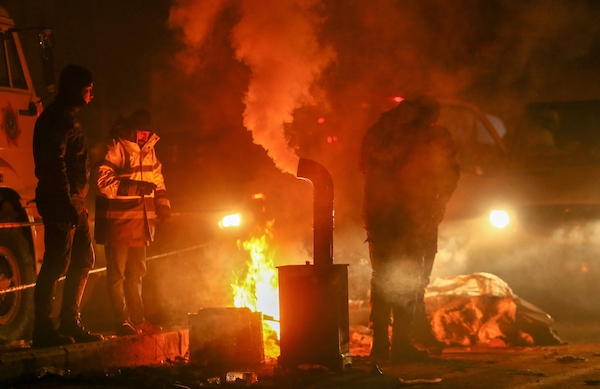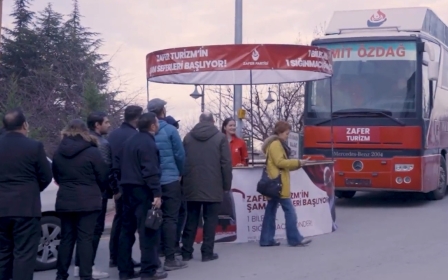Turkey earthquake: Ultranationalists campaign against Syrian refugees after deadly disaster

Three days after the devastating twin earthquakes that hit Turkey and Syria, a respected Turkish professor of geophysics warned of a "national security problem" that was looming: Syrian refugees.
"A national security problem has arisen in cities such as Kilis, Hatay, Adana, Gaziantep and Sanliurfa, where refugees are concentrated," Professor Ovgun Ahmet Ercan wrote on Twitter.
"When migration out of Hatay, which is half destroyed, begins, Syrians will be the rulers of cities like Hatay and Kilis. Military [should be] deployed."
Ercan, an expert on earthquakes and disasters, wasn't alone in warning against the Syrian presence in southern Turkey and pointing the finger at them.
Residents of the devastated regions have been angry due to a slow emergency response in the first 48 hours after the Monday earthquakes, which have so far left more than 22,000 dead in both Turkey and Syria.
New MEE newsletter: Jerusalem Dispatch
Sign up to get the latest insights and analysis on Israel-Palestine, alongside Turkey Unpacked and other MEE newsletters
Many took to social media to criticise the looting of aid convoys and stealing of valuables from collapsed houses and stores that were filmed and shared online.
Translation: Looting continues. This time they steal a washing machine
Some were quick to say that Syrians were behind the looting, although there is little evidence to suggest so. Others claimed Syrians were getting better disaster aid despite, once again, no proof.
"From the first moments of Turkey's greatest disaster, refugees and fugitives have been looting cities," claimed Umit Ozdag, leader of the far-right anti-refugee party the Homeland, on Wednesday. "It's called dishonour! You caused this trouble Erdogan and they will go, you will too!"
Ozdag has been leading a public campaign against Syrians both on social media and on the ground since the earthquake, as he visits the affected areas. His party is running a platform to forcibly return millions of refugees to Syria.
Footage of the looting shared on social media does not provide any evidence that those stealing goods and aid are Syrians.
Many videos appeared to show people speaking in perfect Turkish while looting local supermarkets.
'We are all earthquake victims here. No one should discriminate against people based on their race'
- Suleyman Soylu, Turkish interior minister
Turkish Interior Minister Suleyman Soylu, who is in a bitter battle against Ozdag over his anti-migrant rhetoric, said on Thursday that 99 percent of the looting reports were proven to be fake.
"There might be theft and criminal incidents during this period as it happens regular times," Soylu said in a televised statement.
"We are all earthquake victims here. No one should discriminate against people based on their race. These people were not stealing yesterday. Did they wait for the earthquake to steal?"
More misinformation shared widely by commentators on social media alleged that the government was relocating only Syrian earthquake survivors to a women-only dormitory in Mersin, discriminating against Turks.
Some people even shared unverified footage showing people apparently having sex and smoking shisha in the building, suggesting they were Syrians.
Ali Mahir Basarir, a member of parliament from the main opposition party CHP, said he had inspected the building and found out that there were many earthquake survivors who were relocated from different parts of the disaster zone. He denied that the building was only hosting Syrians.
"I walked through the rooms. There are citizens coming from Samanda, Malatya and Kahramanmaras as well as surely some Syrian citizens," he said. "There is nothing like a shisha or sexual images in the building. Rooms designs are different from the footage which was shared. They are old videos."
Turkey shelters more than 3.6 million Syrians along with close to 320,000 refugees from other nationalities, making it the world's largest refugee-hosting country, according to the UN. A decade on from the outbreak of the Syrian war, the relationship between the communities has grown tense.
Syrians help aid efforts
Ismail Coktan, a Turkish journalist specialising in Syrian affairs, told Middle East Eye it was expected that anger would be directed at Syrians at such a time of great national disaster, which upends public opinion.
"Due to the refugee problem, which has long been fuelled by various ultranationalist parties, people's [anger] can turn on the Syrian refugees," he said.
Coktan added that not only in the earthquake disaster, but in any extreme incident in Turkey, far-right circles first blame Syrians for anything.
"Some Syrians participated in the looting of some shops in Hatay along with other Turkish citizens, but these ultranationalist groups behave like all Syrians were now looters," he said. "This could happen during any disaster."
Contrary to the image painted by some far-right voices, Syrian refugees in the affected area and across Turkey had joined emergency aid efforts.
They were volunteering as they viewed themselves as part of Turkish society and were directly affected by the earthquakes, Coktan said.
There are nearly 1.9 million Syrian refugees living in the 10 provinces impacted by the earthquakes.
"I hope I can get there soon," Abdulrahman al-Ahmad, a Syrian refugee living in Istanbul who volunteered to help aid efforts, told MEE on Tuesday. "I have registered all my data to volunteer to join the search for survivors under the rubble."
Omer Ali, a Syrian grocery shop owner, distributed fruits and vegetables for free in Kahramanmaras, the epicentre of one of the earthquakes.
"Let them come. There are oranges, there are apples, there is everything. Let them take it, brother, for the sake of Allah," he said.
Bulent Yildirim, the chairman of the Islamic relief group IHH, said that Syrians in Turkish-controlled areas in northern Syria had baked 300,000 loaves of bread a day to ship them to earthquake-hit areas.
"Both sides are helping each other," he said.
This article is available in French on Middle East Eye French edition.
Middle East Eye delivers independent and unrivalled coverage and analysis of the Middle East, North Africa and beyond. To learn more about republishing this content and the associated fees, please fill out this form. More about MEE can be found here.





